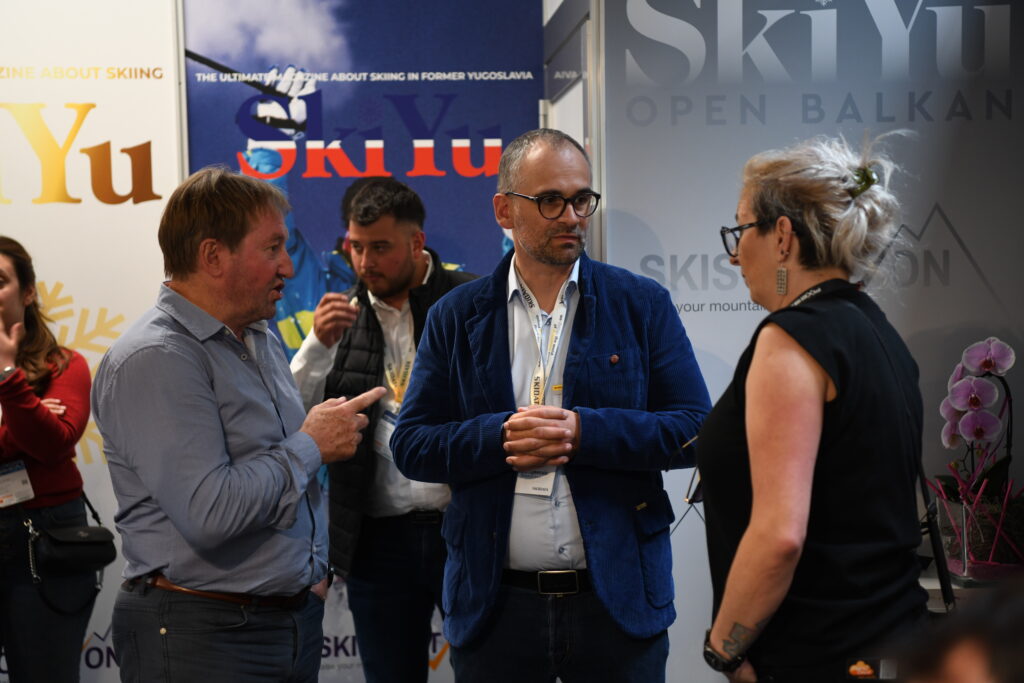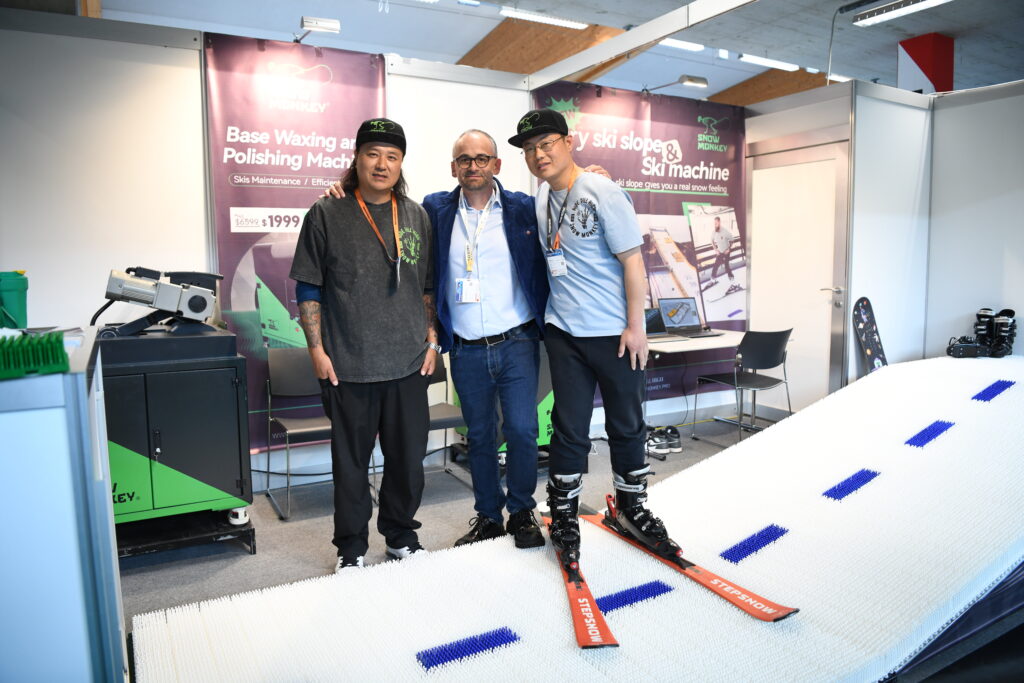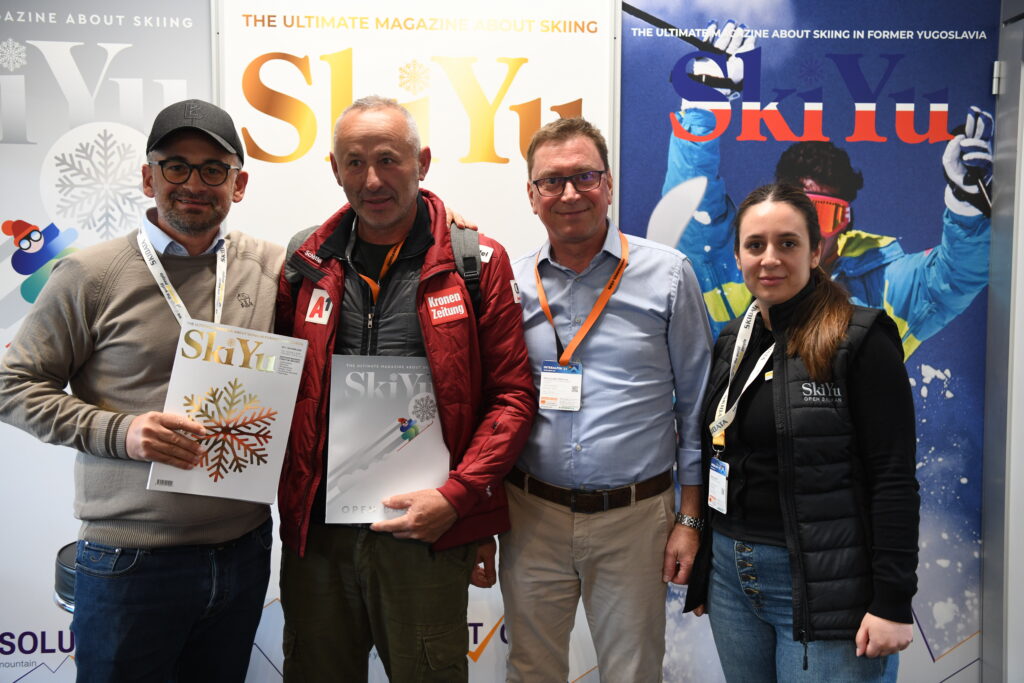Transforming Jahorina into a year-round, world-class destination through smart technologies, global partnerships, and sustainable innovation
 In an interview with Dejan Ljevnaić, Director of the Jahorina Olympic Centre, we uncover key details of the ongoing negotiations with the renowned company Interalpin, as well as the ambitious plans to upgrade infrastructure and services on Mount Jahorina — all to position it alongside Europe’s leading ski destinations.
In an interview with Dejan Ljevnaić, Director of the Jahorina Olympic Centre, we uncover key details of the ongoing negotiations with the renowned company Interalpin, as well as the ambitious plans to upgrade infrastructure and services on Mount Jahorina — all to position it alongside Europe’s leading ski destinations.
Interalpin marked its 51st edition this year as the most important trade fair in the winter sports industry, once again running for four days from April 20 to 23. What did you find most interesting or innovative at this year’s Interalpin?
Interalpin is a leading event in the winter tourism and skiing industry, shaping future trends. This year, the focus was on sustainability, automation, and smart systems for ski resorts. Innovations included AI-driven ski traffic analytics, automated snowmaking that monitors microclimates in real-time, and digital maps that help users plan routes based on crowd levels, weather conditions, and skill level. Attention to energy efficiency was evident in ski lifts consuming less electricity and hybrid transport systems in mountain areas.
One standout innovation came from LEITNER, which unveiled a new standard for unidirectional monocable gondolas. These gondolas feature enhanced noise reduction, easier maintenance, and improved safety. Additionally, their “LeitPilot” technology utilises LIDAR sensors to enable autonomous operation of gondolas, a major leap toward fully automated ski resort management.
 Another exciting development was the introduction of electric snow groomers. These eco-friendly, battery-powered vehicles operate quietly and produce zero emissions, making them a significant advancement in sustainability. Resorts worldwide are increasingly adopting these groomers due to their efficiency and environmental benefits. For example, Val Cenis in France became the first ski resort to deploy the 100% electric “Husky E-Motion” groomer in 2022. This vehicle is designed for preparing cross-country ski trails, walking paths, and children’s areas, all while delivering high performance with minimal harmful emissions. Similarly, the Flumserberg resort in Switzerland has been testing this electric groomer since December 2023, receiving positive feedback for its quiet operation and efficiency.
Another exciting development was the introduction of electric snow groomers. These eco-friendly, battery-powered vehicles operate quietly and produce zero emissions, making them a significant advancement in sustainability. Resorts worldwide are increasingly adopting these groomers due to their efficiency and environmental benefits. For example, Val Cenis in France became the first ski resort to deploy the 100% electric “Husky E-Motion” groomer in 2022. This vehicle is designed for preparing cross-country ski trails, walking paths, and children’s areas, all while delivering high performance with minimal harmful emissions. Similarly, the Flumserberg resort in Switzerland has been testing this electric groomer since December 2023, receiving positive feedback for its quiet operation and efficiency.
These innovations, particularly electric snow groomers, show that sustainability is no longer an option but a necessity in the winter sports industry. With a focus on reducing environmental impact, these technologies are paving the way for a more eco-conscious future, ensuring that winter sports remain viable for generations to come.
We all share a common goal – to improve the quality of services in mountain resorts while preserving the natural environment
At the fair, I held several meetings with representatives of renowned electric snow groomer manufacturers, most notably Xelom, which I also shared publicly on my social media profiles. In line with global trends and the growing need for environmental protection, Jahorina will also adopt this model, reaffirming its commitment to green solutions and modernising the ski resort to the latest international standards.
Electric groomers are transforming mountain resorts by reducing CO₂ emissions and creating a quieter, more pleasant atmosphere for visitors. A key innovation is the mobile gondola system, CONNX, which allows vehicles to drive directly to lifts where the cabin attaches to the cable. At the end of the ride, passengers can be transported to hotels or other locations, enhancing connectivity between resorts and urban areas. For young skiers, products like GoSki and SkiBike make learning fun, while smart ski poles (“soške”) help with movement and skier tracking. The most exciting development that personally fascinated me is integrating data from ticketing, snowmaking, and hospitality into a unified system, enabling real-time management of the entire resort, exactly the direction Jahorina is heading.
Have you established any concrete partnerships or held discussions at the fair that could lead to new investments or technological solutions on Jahorina?
Absolutely. Fairs like Interalpin are not just showcases for equipment – they are places where visions of development are created. During the four days in Innsbruck, I had intensive talks with leading global companies in the fields of artificial snowmaking, digital ski resort management systems, and next-generation lifts and cable cars.
At the fair, I had the opportunity to meet some of the most influential people in the industry who are shaping the future of skiing, including:
- Michael Bitterl from Doppelmayr – a legend in the cable car industry and my great mentor
- Hermann Thaler – founder and director of Thalere. U, and a pioneer in the development of modern ski depots and rental systems
- Franz Holzer and Philipp Schälger from SkiDate
- Kiliaan Toorenaar – founder of the SkiPass app
- Mario Delać from e-Liberty Services
- Julian and Christian from TechnoAlpin
A key meeting was with TechnoAlpin, our successful partner, where we discussed further opportunities for automated snowmaking in new areas of Jahorina. We also engaged with companies offering interactive digital systems, including smart mobile apps that provide personalised info on skiing, slope conditions, and restaurant services. Additionally, we held discussions with colleagues from regional ski resorts, exchanging valuable insights on sustainable technologies and enhancing visitor experiences. These exchanges were invaluable, as we all share a common goal: improving mountain services while protecting the environment. Collaboration with regional resorts strengthens our efforts to modernise Jahorina, positioning it as part of a wider network of eco-friendly mountain destinations. Plans are underway to establish partnerships with European resorts, focusing on knowledge exchange and joint promotions, to integrate Jahorina into a global network of ski destinations through concrete projects.
 How widespread have modern ski resort management technologies, such as digital maps, automated snowmaking systems, and smart capacity tracking, become, and are regional resorts following suit?
How widespread have modern ski resort management technologies, such as digital maps, automated snowmaking systems, and smart capacity tracking, become, and are regional resorts following suit?
A modern ski centre without advanced technology is no longer competitive. State-of-the-art snowmaking, traffic monitoring, digital ticketing, and user-oriented apps are not just advantages; they are now standard. What we once considered “technological advancement” has now become a basic requirement; guests expect high service levels, instant information, and safety. At Jahorina, we’ve made significant progress with a smart snowmaking system for efficient resource use and quick slope preparation, as well as a modernised ticketing and ski-pass control system. While some regional resorts follow this trend, many lag behind. Regional collaboration, knowledge sharing, and joint investment are key, and Jahorina is ready to lead the way.
How is Jahorina positioning itself amid the growing internationalisation of ski tourism and the competition evident at Interalpin? Are you aiming for a greater share of foreign visitors and cooperation with global partners?
Jahorina is gaining recognition as an international ski destination, confirmed once again at Interalpin. Our vision is clear: we aim to make Jahorina the leader in Southeast Europe, not only through infrastructure investments but also through top-tier service and visibility in foreign markets. We already attract guests from Serbia, Croatia, Montenegro, Austria, Germany, Turkey, Hungary, Romania, and even Israel. Our international events—like the Open Balkan Ski project and various sports and cultural festivals—are putting us firmly on the global map.
Through investment in smart systems, infrastructure projects, staff training, and promotion, Jahorina is moving towards becoming a mountain open to the world, 365 days a year
We’ve also strengthened partnerships with global brands, travel agencies, and ski clubs. Moving forward, we’ll focus on offering tailored packages for international visitors, direct flight connections, digital marketing, and strategic investment partnerships. In addition to winter innovations, Interalpin also showcased summer attractions that inspired us to expand Jahorina’s summer offerings. Particularly inspiring were family-friendly adrenaline experiences, such as summer toboggans, zip lines, and multifunctional bike parks, which are among the ideas we’re exploring. By investing in smart systems, infrastructure, and promotion, Jahorina is becoming a year-round destination.